
Legislation could soon be introduced in the US state of Illinois that aims to promote the cost-effective deployment of energy storage on the grid.
Sponsored by Democrat Senator Bill Cunningham, Senate Bill 1587 (SB1587) would make energy storage-friendly amendments to the Illinois Power Agency Act, which is the framework for electricity procurement in the service territories of Illinois grid operators ComEd and Ameren.
SB1587 was filed by the Senator in February, when it had its first reading in the Senate. Now being considered by lawmakers, it “makes legislative declarations and findings regarding the deployment of energy storage systems,” according to the bill’s text.
It calls for the establishment of an energy storage credit system, which would be added to the procurement processes of the Illinois Power Agency (IPA), the independent state body established in 2007 with duties that include developing electricity procurement plans and conducting competitive procurement processes, long-term electricity system planning and the development of electric and co-generation facilities.
Through the bill, the agency would be authorised to conduct competitive solicitations for storage credits and execute contracts to ensure the Illinois electric system gets sufficient energy storage resources. It would also be tasked with developing an electricity storage procurement plan within 90 days of the bill’s amendments becoming effective.
Developers of projects and resources would bid a strike price into those procurements. SB1587 also authorises the IPA to “develop and implement a firm energy resource procurement plan,” while the agency should also conduct an analysis beginning no later than 31 December 2026 whether contracted energy storage resource capacity and duration is sufficient to meet renewable energy standards and carbon emissions limits in the state. This analysis would be conducted every two years thereafter.
Cunningham was involved in creating the key Illinois legislation SB2408, which commits the state to 50% renewable energy by 2040 and 100% by 2050, including a schedule for the phase out of coal, oil and gas power plants. In the process, the bill, signed into law in 2021, more than doubled Illinois’ renewable energy budget, created a workforce training programme and allowed for two transmission lines to be built.
According to the US Energy Information Administration (EIA), as of July 2022 Illinois had the country’s fifth largest energy consumption among states. Just over half of that comes from nuclear, the highest proportion of any US state, with about 30% coal – Illinois has the second-largest recoverable coal reserves and accounts for about 6% of US coal production – under 10% natural gas and just slightly more than that in renewable energy generation.
A key part of the climate and renewables bill, officially the Climate and Equitable Jobs Act, is a coal-to-clean energy transition strategy, which seeks to give businesses and communities with a stake in the coal economy a smoother exit plan from the fossil fuel.
Cunningham appears to remain committed to furthering the adoption of renewable energy in the state, with his recent championing of energy storage alongside another bill the Senator has sponsored to relax zoning regulations that he claimed have been restrictive of developments.
The move to amend Illinois’ energy market framework to incorporate solicitations for energy storage procurements could echo the recent steps proposed by public bodies in New York, another state which looks likely to introduce tenders for energy storage resources, with their introduction expected in about a year’s time.


